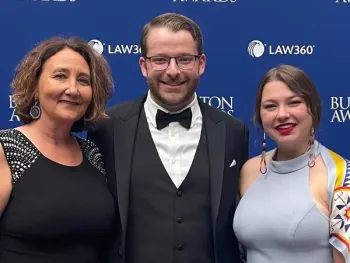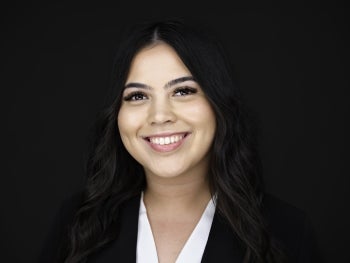ASU Law students earn record number of judicial clerkships

According to data from the American Bar Association, graduates from the Sandra Day O'Connor College of Law at Arizona State University secured a record 39 judicial clerkships for the 2023–24 year — 15% of the graduating class. ASU photo
Students who graduate from the Sandra Day O’Connor College of Law at Arizona State University are used to making an impact. Now, they’re breaking records.
According to data from the American Bar Association, ASU Law counted a record 39 judicial clerkships for the 2023–24 year — 15% of the graduating class. That included seven federal and 32 state positions. Graduates secured 32 clerkships the year prior.
A judicial clerkship is a one- or two-year position that pairs a law graduate with a judge to assist them with formulating decisions. Clerks often review court records, research the law and help draft opinions. Clerkship positions are prestigious and competitive.
ASU Law alums who graduated in 2023 earned clerkship positions across the U.S. — from Alaska to Washington, D.C.
Noah Goldenberg, a graduate of the Indian Legal Program, secured two clerkships: one with Judge Murray Snow on the U.S. District Court, District of Arizona, and one with Judge Susan Graber on the U.S. Court of Appeals, Ninth Circuit, which will begin later this year in Portland, Oregon. He always knew he wanted to clerk for a judge following graduation, so he began the application process, like most clerks, at the end of his second year of law school.
“It’s a great way to train, to see a lot of what good or bad lawyering is,” he said of the experience, nearly one year in. “You get to see tactics, how people argue the law and their style. You also get to see how your work affects people. Law school is, save for clinics and seminars, removed from impact. The study of law is theoretical, and you don’t really deal with parties, so it’s important to see how it works. I’m fortunate to work for my judge, who is very, very committed to our betterment and education and is constantly making sure we have great experiences and get a good array of cases.”
Now that he has some trial experience, Goldenberg will get a taste of the appellate side when he starts his second clerkship this year, which he believes will be better thanks to his first clerkship experience.
“Keep doors open until they should be shut,” he encouraged other law students who may be on the fence about applying. “I don’t know many who regret their clerkships, but I know people of all ages who regret not doing one.”
Shelby Respicio, judicial law clerk to Vice Chief Justice Ann Timmer on the Arizona Supreme Court (who will take over as chief justice in July), is excited to use the skills she’s gained during her clerkship in her next role practicing real estate law at Perkins Coie in Phoenix.
"Aside from honing my research and writing skills, I came in not sure what other transferable skills I would learn," she said. "But now I know that clerking allowed me to become more of an independent thinker and strengthened my ability to engage with the law in great depth. I've been given the opportunity to work in different fields of law in a one-year span, which I will likely never get to do again in practice. This allowed me to become somewhat knowledgeable about so many different areas."
There are 14 clerks on the Arizona Supreme Court — two per judge — and they all work closely together in chambers, brainstorming and learning from each other. Timmer also takes a personal interest in her clerks and mentors them long after they leave her chambers. Respicio, who is originally from Guam, credits the clerkship with helping her establish more ties in Phoenix, which she now calls home.
“Working at the Arizona Supreme Court has made me more in touch with the state itself and the different facets of government,” she said. “I see myself building a life here now.”
Judges and employers are drawn to ASU Law students for their strong legal writing skills (honed by the Legal Method and Writing program, ranked No. 5 in the nation by U.S. News & World Report), expertise gained through the dynamic externship program and hands-on clinical experiences. Despite their perceived competitiveness, Assistant Dean of Student Career Success and Employer Relations Trevi Grant encouraged all ASU Law students to apply for clerkship opportunities.
"Judicial clerkships are like gold for students," Grant said. “Clerkships boost their writing skills, connect them with seasoned judges who can guide them and give them a behind-the-scenes look at how judges make decisions. It is like a yearlong crash course in lawyering that sets them up for success in their future legal careers.”
More Law, journalism and politics
Can elections results be counted quickly yet reliably?
Election results that are released as quickly as the public demands but are reliable enough to earn wide acceptance may not always be possible.At least that's what a bipartisan panel of elections…
Spring break trip to Hawaiʻi provides insight into Indigenous law
A group of Arizona State University law students spent a week in Hawaiʻi for spring break. And while they did take in some of the sites, sounds and tastes of the tropical destination, the trip…

LA journalists and officials gather to connect and salute fire coverage
Recognition of Los Angeles-area media coverage of the region’s January wildfires was the primary message as hundreds gathered at ASU California Center Broadway for an annual convening of journalists…



